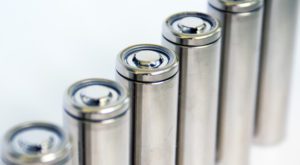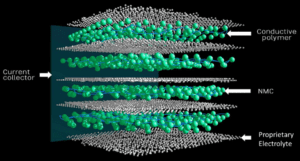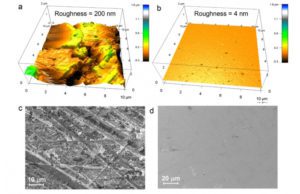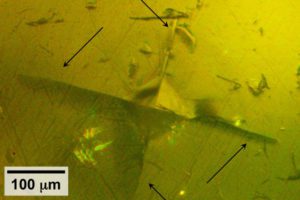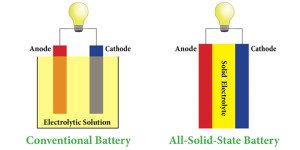Researchers at the University of Waterloo in Canada have developed a way to stabilize lithium metal electrodes by forming a single-ion-conducting and stable protective surface layer in vivo. In “An In Vivo Formed Solid Electrolyte Surface Layer Enables Stable Plating of Li Metal,” published in the journal Joule, Quan Pang, Xiao Liang and colleagues explain how they… Read more »
Search Results Found For: "dendrite"
Swiss researchers develop prototype solid-state sodium battery
Researchers from Empa, the Swiss Federal Laboratories for Materials Science and Technology, and the University of Geneva (UNIGE) have built a prototype solid-state battery based on sodium as an alternative to lithium. The scientists described their research in the journal Energy and Environmental Science. Using metallic lithium as an anode material would theoretically increase energy… Read more »
Fisker files patents on solid-state battery tech
Reborn automaker Fisker has filed patents for a new type of solid-state battery technology that it says could lead to much greater energy density and faster charging times. According to Fisker, current limitations of solid-state technology include low electrode current density, limited temperature ranges and non-scalable manufacturing processes. Other drawbacks include: low power and low… Read more »
DOE awards $6 million to first crop of Battery500 Seedlings
The Battery500 consortium, led by the DOE’s Pacific Northwest National Laboratory (PNNL), intends to build a battery pack with a specific energy of 500 Wh/kg, which would more than double the 170-200 Wh/kg per kilogram in today’s typical EV battery. Part of the initiative is the “Seedling” program, which identifies new and risky battery research… Read more »
MIT-led study suggests route to improving solid-state batteries
Replacing a liquid electrolyte with a solid electrolyte could offer major advantages for both safety and energy storage capacity, but so far, attempts to develop a practical solid-state cell have run into major obstacles. Liquid electrolytes can be flammable, and are also prone to the formation of dendrites -thin, fingerlike projections of metal that build… Read more »
DOE awarding $19 million to 22 advanced vehicle technologies projects
The DOE is awarding $19.4 million to 22 new cost-shared research projects in the fields of advanced batteries, lightweight materials, emission control, and energy-efficient mobility systems. Fifteen of these are Phase 1 Battery Seedling projects, aimed at battery materials and approaches that complement the Battery500 Consortium’s research. Promising Phase 1 awardees will be competitively weeded… Read more »
MIT researchers investigate mechanics of sulfide-based solid electrolyte material
IMAGE: Using specialized equipment, a team from MIT did tests in which they used a pyramidal-tipped probe to indent the surface of a piece of the sulfide-based material. Surrounding the resulting indentation (seen at center), cracks were seen forming in the material (indicated by arrows), revealing details of its mechanical properties. Battery scientists are the world are exploring… Read more »
UT Austin team developing solid-state sodium or lithium battery cell
Researchers at the University of Texas at Austin have devised a new strategy for an all-solid-state sodium or lithium EV battery cell. In “Alternative Strategy for a Safe Rechargeable Battery,” published in Energy & Environmental Science, noted lithium-ion battery pioneer Professor John Goodenough and his colleagues explain that the cells use a solid glass electrolyte…. Read more »
Penn State professor wins grant to develop self-healing layers for Li metal anodes
Donghai Wang, who leads the Energy Nanostructure Laboratory at Penn State, has won a $1.1-million grant from the DOE’s Vehicle Technologies Office to develop a new lithium-ion conductor that will prevent the formation of dendrites, the bane of lithium metal anodes. Wang and his team plan to use thin layers of nanostructured hybrid materials to… Read more »
Sion Power’s Licerion advances Li-metal anode technology
Arizona battery developer Sion Power has reported that one of its Licerion battery systems has achieved specific energy of 400 Wh/kg, energy density of 700 Wh/L and a lifetime of 350 cycles. Dr. Yuriy Mikhaylik, Sion Power’s Director of Materials, presented details at a recent meeting of the Electrochemical Society. Licerion, a product of Sion… Read more »




